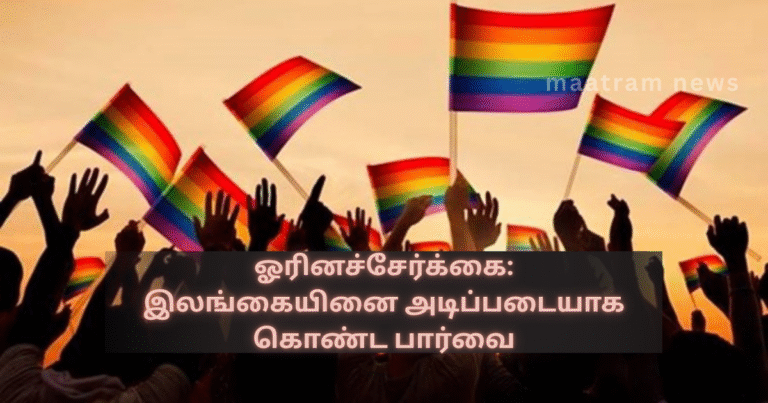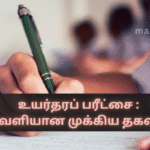மனித சமூகத்தில் Homosexuality: A Perspective Based on Sri Lanka ஒவ்வொருவரின் அடையாளம், உணர்ச்சி மற்றும் வாழ்க்கை அனுபவங்கள் மிக முக்கியம். பாலின அடையாளம் மற்றும் பாலியல் ஈர்ப்பு என்பது இயற்கையான ஒரு பரிமாணமாகும். அதில் ஓரினச்சேர்க்கை (Homosexuality) என்பது ஒரே பாலினத்துடனான ஈர்ப்பை அடையாளப்படுத்தும் தன்மை. இது புதியது அல்ல; இருப்பினும் சமூக ஒப்புதல் இல்லாத காரணத்தால், சிலர் இதனை “புதிய சவால்” என்று கருதுகிறார்கள்.
இலங்கையில் ஓரினச்சேர்க்கையின் நிலை
இலங்கையில் அதிகாரப்பூர்வ கணக்கெடுப்பு இல்லை. ஆனால் 2018 ஆம் ஆண்டில் தேசிய பால்வினை நோய் மற்றும் எய்ட்ஸ் கட்டுப்பாட்டு திட்டம் (NSACP) வெளியிட்ட மதிப்பீட்டின்படி:
“MSM” (Men who have Sex with Men) சுமார் 7,500 பேர்.
“Transgender women” சுமார் 2,200 பேர்.
சமூக அமைப்புகள் (Equal Ground, UNAIDS) கூறியுள்ளன: 18–65 வயது இலங்கை மக்களில் 10–12% பேர் LGBTIQ அடையாளம் கொண்டதாகத் தெரிவிக்கிறார்கள். இதில் பெரும்பான்மையும் தங்கள் அடையாளத்தை வெளிப்படுத்தவில்லை; அதனால் உண்மையான எண்ணிக்கை அதிகமாக இருக்கலாம்.
மனவியல் மற்றும் உயிரியல் அடிப்படை
உலக சுகாதார அமைப்பு (WHO) மற்றும் அமெரிக்க மனநல சங்கம் (APA) ஓரினச்சேர்க்கையை நோயாக அல்ல, இயற்கையான மனநிலை என அறிவித்துள்ளனர். இதற்கு பின்வரும் காரணங்கள் உண்டு:
மரபணு மாற்றங்கள்
ஹார்மோன்கள்
குழந்தைப் பருவ அனுபவங்கள்
மனநிலைத் தனித்துவங்கள்
அதனால் இதை “அசாதாரணம்” அல்லது “பிழை” என்று கூறுவது அறிவியல் கோணத்திலிருந்து தவறு.
கலாச்சார மற்றும் சமூக தாக்கம்
இலங்கையில் குடும்பம் மற்றும் திருமணம் பெரும்பாலும் ஆண்-பெண் உறவை மையமாகக் கொண்டது.
மத பார்வை: பல மதங்களில் திருமணத்தின் புனித வட்டத்துக்குள் மட்டுமே பாலியல் உறவை ஏற்றுக் கொள்கின்றனர்.
சமூக கட்டமைப்பு: பாரம்பரிய குடும்பம்-திருமணம்-பிள்ளைப் பேறு முறை ஓரினச்சேர்க்கை முறைகளை “சவால்” போலத் தோற்றுவிக்கிறது.
நவீன மாற்றங்கள்: உலகமயமாக்கல், இணையம் மற்றும் கல்வி காரணமாக இளம் தலைமுறை பல்வேறு அடையாளங்களை புரிந்துகொள்கிறது.
மனநிலை மற்றும் உணர்வுகள்
ஓரினச்சேர்க்கையாளர்கள் பெரும்பாலும் மன அழுத்தம், பயம், தனிமை மற்றும் சில நேரங்களில் தற்கொலை எண்ணங்களை சந்திக்கிறார்கள். குடும்பம் மற்றும் சமூகத்திலிருந்து வரும் மறுப்பு அவர்களை தனிமைப்படுத்துகிறது. அதனால் அவர்களும் அன்பு, மரியாதை மற்றும் புரிதலை தேடுகிறார்கள், இது மனிதன் அனைவருக்கும் இயல்பான உரிமை.
பொதுமகனாக நாம் செய்ய வேண்டியது
மனிதனாகக் காண்பது: ஓரினச்சேர்க்கையாளர்களை வேறுபட்டவர்கள் அல்ல, மனிதர்கள் என்று புரிந்து கொள்வது முக்கியம்.
ஏற்றுக்கொள்வது ≠ ஊக்குவிப்பு: அவர்களின் மனித உரிமை மற்றும் மரியாதையை பாதுகாத்தல் மட்டுமே போதும்.
கலாச்சார சமநிலை: சமூகத்தின் பண்பாட்டை மதித்து, “பேதமின்றி மரியாதை” என்ற கோட்பாட்டை நிலைநாட்ட வேண்டும்.
சமூக விழிப்புணர்வு தேவைகள்
பாடசாலைகளில் மற்றும் பல்கலைக்கழகங்களில் விரிவான பாலியல் கல்வி (CSE)
மனநல ஆலோசனை மையங்கள் – பாதுகாப்பான சூழல்
சமூக ஊடகங்களில் நேர்மையான விழிப்புணர்வு – புரிதலை ஊக்குவித்தல்
சட்டங்கள் – பாகுபாடு, வன்முறை எதிர்ப்பு
ஓரினச்சேர்க்கை கலாச்சாரத்திற்கு எதிரானது அல்ல; இது மனித உணர்வுகளின் இயற்கையான வெளிப்பாடு. சமூகமாக நாம் எதிர்கொள்ள வேண்டியது பயமும் அவமதிப்பும் அல்ல, புரிதலும் கருணையும் ஆக வேண்டும். இலங்கை சமூகத்தின் அழகு அதன் பல்வகைமையிலும் பரஸ்பர மரியாதையிலும் உள்ளது. எனவே நமது கடமை:
“பண்பாட்டை காப்பாற்றி, மனித மரியாதையை உறுதிசெய்த சமூகத்தை உருவாக்குதல்.”
மேலதிக தகவல்களுக்கு மாற்றம் செய்திகள் இணையத்தளத்தினுள் பிரவேசியுங்கள்.
மேலதிக தகவல்களை உடனுக்குடன் பெற்றுக்கொள்ள மாற்றம் செய்திகள் முகநூல் பக்கத்தை பின்தொடரவும்.
Homosexuality: A Perspective Based on Sri Lanka
Introduction
In human society, every individual’s identity, emotions, and life experiences play a crucial role. Gender identity and sexual attraction are natural dimensions of human existence. Homosexuality refers to the natural tendency of being attracted to the same sex. It is not a new phenomenon; however, due to the lack of social acceptance, some perceive it as a “new challenge.”
The Situation of Homosexuality in Sri Lanka
There is no official census regarding homosexual individuals in Sri Lanka. However, according to a 2018 estimate by the National STD/AIDS Control Programme (NSACP):
- Around 7,500 individuals are categorized as “MSM” (Men who have Sex with Men).
- Approximately 2,200 individuals are transgender women.
Social organizations like Equal Ground and UNAIDS report that about 10–12% of Sri Lankans aged 18–65 identify as LGBTIQ. Most of them have not disclosed their identity publicly, so the actual numbers may be higher.
Psychological and Biological Basis
The World Health Organization (WHO) and the American Psychological Association (APA) have recognized that homosexuality is not a disease, but a natural variation of human psychology. The contributing factors include:
- Genetic variations
- Hormonal influences
- Childhood experiences
- Psychological traits
Therefore, labeling it as “abnormal” or “wrong” is scientifically inaccurate.
Cultural and Social Impact
In Sri Lanka, family and marriage are traditionally centered around heterosexual relationships.
- Religious Perspective: Many religions accept sexual relations only within the sacred boundaries of marriage.
- Social Structure: The traditional family-marriage-child pattern views homosexuality as a “challenge” to societal norms.
- Modern Changes: Globalization, the internet, and education have allowed the younger generation to understand diverse identities.
Mental Health and Emotional Perspective
Homosexual individuals often face stress, fear, isolation, and sometimes suicidal thoughts. Rejection from family and society can lead to loneliness. Like everyone else, they seek love, respect, and understanding, which are basic human rights.
How Society Should Respond
- Recognize their humanity: Homosexual individuals should be seen as human beings, not “different” or “deviant.”
- Acceptance ≠ Encouragement: Accepting them means protecting their human rights and dignity, not promoting a particular lifestyle.
- Cultural balance: Society must respect cultural values while establishing a principle of “respect without discrimination.”
Need for Social Awareness
- Comprehensive Sexual Education (CSE) in schools and universities.
- Mental health counseling centers providing safe spaces for homosexual individuals.
- Honest awareness campaigns through social media that promote understanding rather than prejudice.
- Legal reforms to prevent discrimination and violence.
Conclusion
Homosexuality is not against culture; it is a natural expression of human emotions. As a society, what we must confront is not fear or prejudice, but understanding and compassion. The beauty of Sri Lankan society lies in its diversity and mutual respect. Therefore, our responsibility is:
“To build a society that preserves culture while ensuring human dignity for all.”



